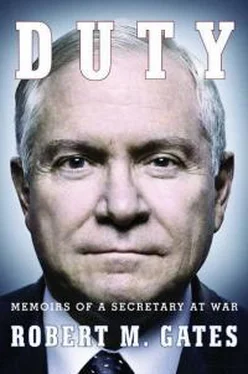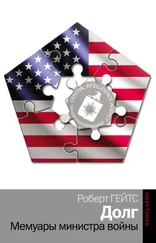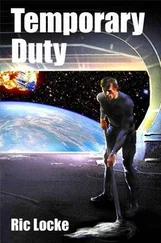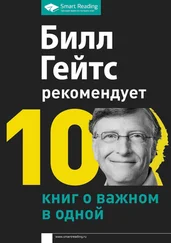I remember sitting at the witness table listening to this litany of woe and thinking, What the hell am I doing here? I have walked right into the middle of a category-five shitstorm . It was the first of many, many times I would sit at the witness table thinking something very different from what I was saying.
After very kind words from both Dole and Boren, it was my turn. I tried to open on a light note but one that reflected I hadn’t lost my perspective. Senator Warner had long felt strongly that a nominee’s family should accompany him or her to the confirmation hearing. Becky had accompanied me only to my very first hearing; I never thought of congressional hearings as family fare. I explained to Senator Warner that Becky had a choice: she could either attend my confirmation hearing or accompany the Texas A&M women’s basketball team to Seattle to play the University of Washington. I said she was in Seattle, and I thought that was a good call. Then I got serious:
I am under no illusion why I am sitting before you today: the war in Iraq. Addressing challenges we face in Iraq must and will be my highest priority, if confirmed.… I am open to a wide range of ideas and proposals. If confirmed, I plan, urgently, to consult with our military leaders and our combat commanders in the field, as well as with others in the executive branch and in Congress.… I will give most serious consideration to the views of those who lead our men and women in uniform.
Then I delivered a warning.
While I am open to alternative ideas about our future strategy and tactics in Iraq, I feel quite strongly about one point: developments in Iraq over the next year or two will, I believe, shape the entire Middle East and greatly influence global geopolitics for many years to come. Our course over the next year or two will determine whether the American and Iraqi people and the next president of the United States will face a slowly but steadily improving situation in Iraq and in the region or will face the very real risk and possible reality of a regional conflagration. We need to work together to develop a strategy that does not leave Iraq in chaos and that protects our long-term interests in, and hopes for, the region.
Those three sentences captured my views on Iraq and what needed to be done, views that would guide my strategy and tactics in Washington and in Iraq for the next two years. As I would say repeatedly, whether you agreed with the launching of the war or not, “We are where we are.”
I concluded my opening remarks with statements from the heart. “I did not seek this position or a return to government. I’m here because I love my country and because the president of the United States believes I can help in a difficult time. I hope you will reach a similar conclusion.” And finally, “Perhaps the most humbling part of the position for which this committee is considering me is knowing that my decisions will have life-and-death consequences. Our country is at war, and if confirmed, I will be charged with leading the men and women who are fighting it.… I offer this committee my solemn commitment to keep the welfare of our forces uppermost in my mind.” When I made that pledge, I could not imagine all that would be required to fulfill it.
In the news coverage of the give-and-take that followed, two exchanges were highlighted. The first was early in the hearing, when Senator Levin asked me whether I believed we were currently winning in Iraq and I simply answered, “No, sir.” The answer was widely celebrated as both realistic and candid and in contrast to earlier administration testimony. If one answer clinched my confirmation, that was it. There was something of an uproar that morning at the White House and in the Defense Department at the answer, and after a break for lunch, I decided to add to my earlier answer what Pete Pace had said the day before, that while we weren’t winning, we weren’t losing either. Above all, I did not want the troops in Iraq to think I was suggesting they were being beaten militarily.
The other exchange was with Senator Edward Kennedy, who talked about the sacrifices of our troops and asked whether, in the policy debates to come, I’d be a “stand-up person” for our national security and for the troops. I replied,
Senator Kennedy, twelve graduates of Texas A&M have been killed in Iraq. I would run in the morning with some of those kids, I’d have lunch with them, they’d share with me their aspirations and hopes. And I’d hand them their degrees. I’d attend their commissioning, and then I would get word of their death. So this all comes down to being very personal for all of us. The statistics, 2,889 killed in combat in Iraq as of yesterday morning: that’s a big number, but every single one of them represents an individual tragedy not only for the soldier who has been killed, but for their entire family and their friends.
I then went on to say,
Senator, I am not giving up the presidency of Texas A&M, the job that I’ve probably enjoyed more than any I have ever had, making considerable financial sacrifice, and frankly, going through this process, to come back to Washington to be a bump on a log and not say exactly what I think, and to speak candidly and, frankly, boldly to people at both ends of Pennsylvania Avenue about what I believe and what I think needs to be done.… I can assure you that I don’t owe anybody anything. And I’m coming back here to do the best I can for the men and women in uniform and for the country.
The remainder of the hearing covered broadly strategic matters as well as the parochial concerns of individual senators. There were perplexing questions, like the one from Senator Robert Byrd of West Virginia, who asked if I supported going to war with Syria. (I said no.) And there were some light moments, such as when Senator Ben Nelson of Nebraska asked what I thought about steadily increasing the bounty on Osama bin Laden by a million dollars a week. I responded, “Sort of terrorist Powerball?”
The open hearing concluded about 3:45 p.m. and was followed by an uneventful and largely congratulatory secret hearing at four. That evening the Armed Services Committee voted unanimously to recommend my nomination to the full Senate for confirmation. The next afternoon, December 6, the Senate voted to confirm me 95 to 2, with three senators not voting. The votes against me were Senators Jim Bunning of Kentucky and Rick Santorum of Pennsylvania, both Republicans. They didn’t think I was nearly aggressive enough in how we should deal with Iran, including potential military action. However, I thought we had our hands full with the wars we were already in without looking for new ones. Avoiding new wars would be at the top of my agenda under both Presidents Bush and Obama. I would always be prepared to use whatever military force necessary to defend American vital interests, but I would also set that threshold very high.
I was not sworn in and did not take up my responsibilities as the new secretary of defense for twelve days after confirmation, probably an unprecedented delay. I felt very strongly about presiding at Texas A&M’s December commencement ceremonies. I also needed a little time to wrap things up at A&M and get moved to Washington, D.C. On reflection, particularly in a time of war, I probably should not have waited. But there was virtually no criticism, and I used the time to good effect.
I was given an office suite in the Pentagon to use until I was sworn in. I filled out paperwork so I could get paid, had my official photo taken, received my badges and ID card, and went through all the procedures experienced by every new employee of the Department of Defense—including one I had not expected. One morning I went to use the bathroom adjacent to my office. I had just shut and locked the door and unzipped my pants when there was a frantic pounding on the door and someone shouted, “Stop! Stop!” Alarmed, I zipped up and opened the door. A sergeant standing there handed me a cup, saying a urine sample was required for a drug test. Even the secretary of defense was not exempt from that.
Читать дальше












